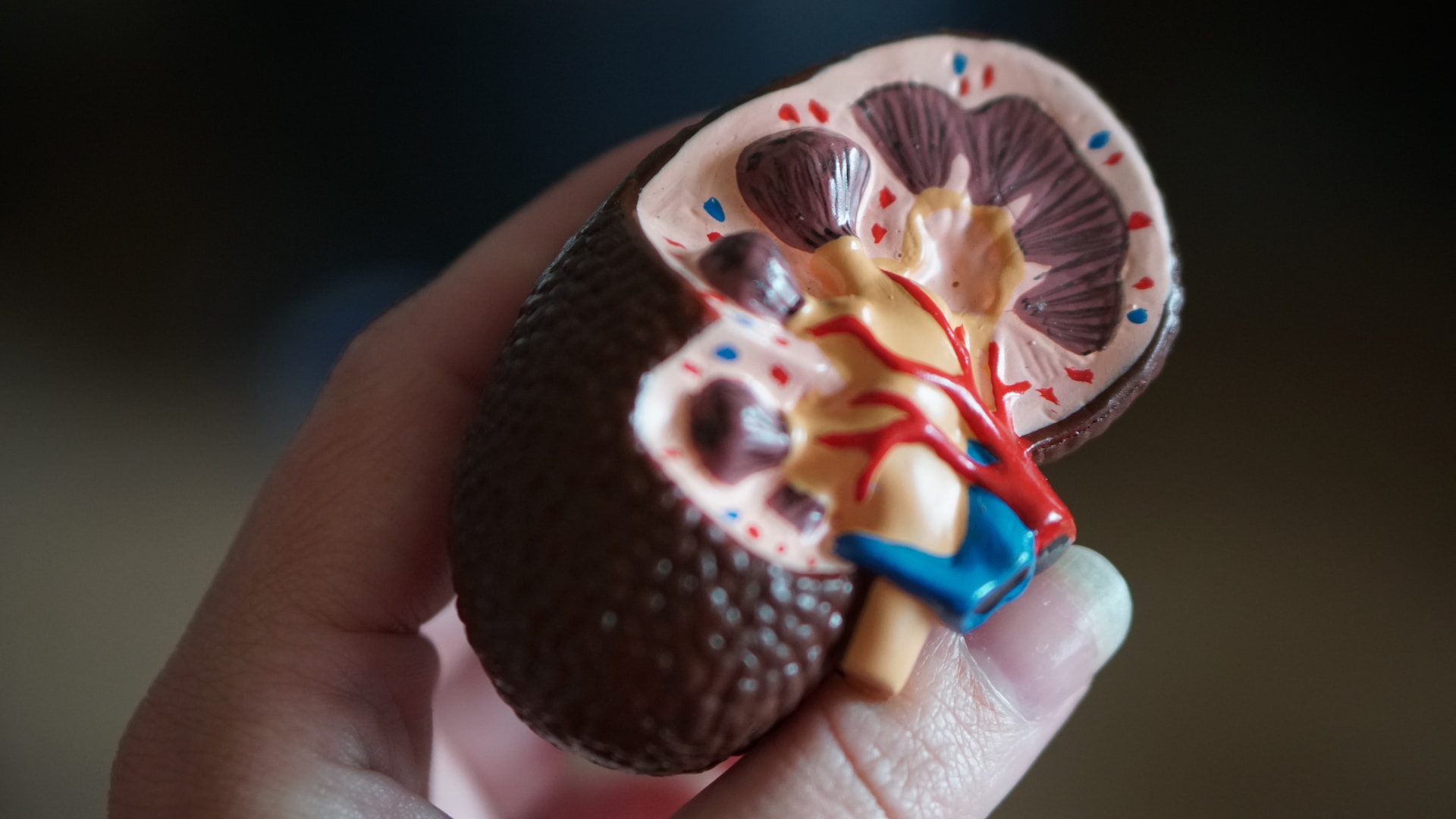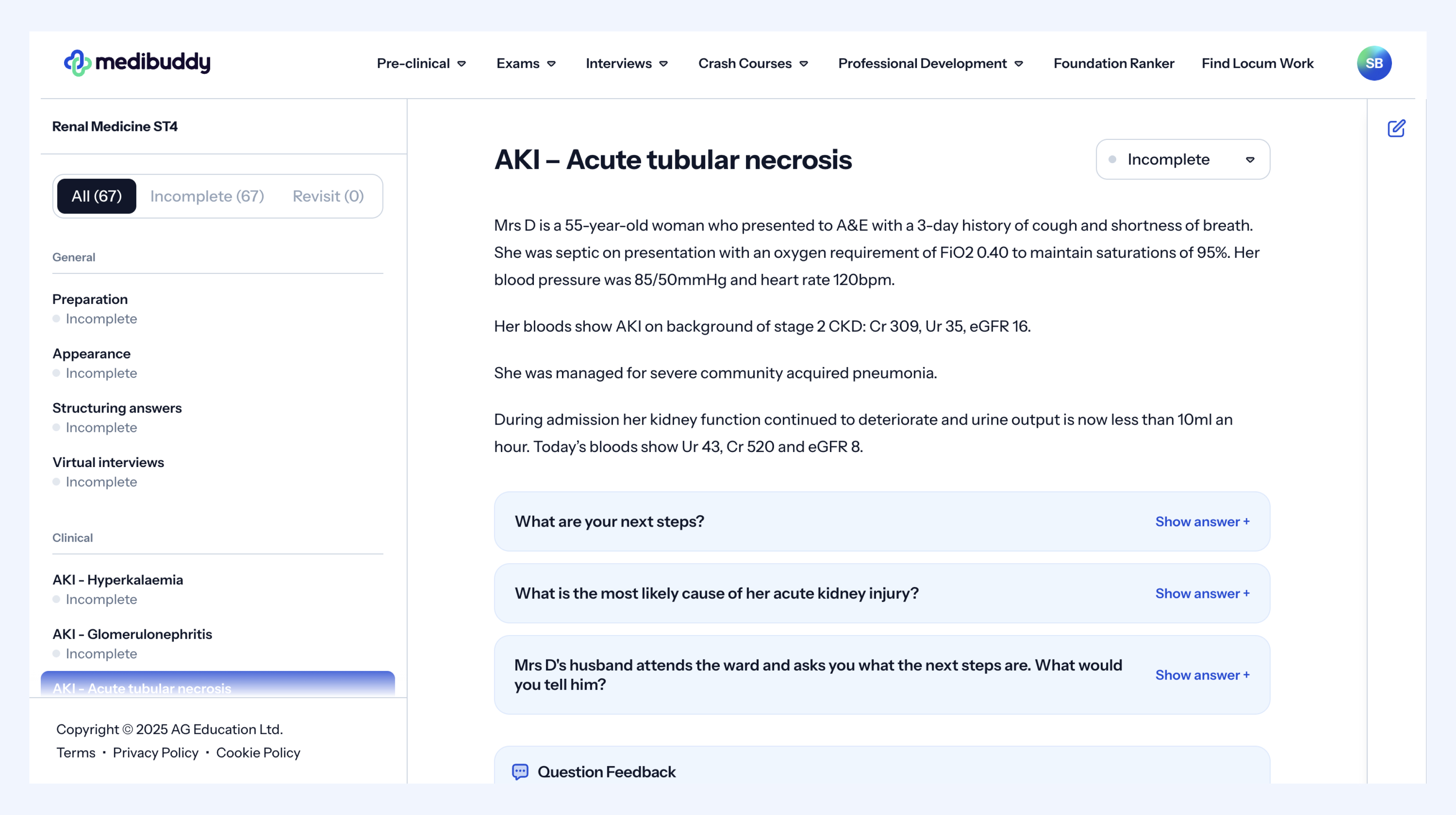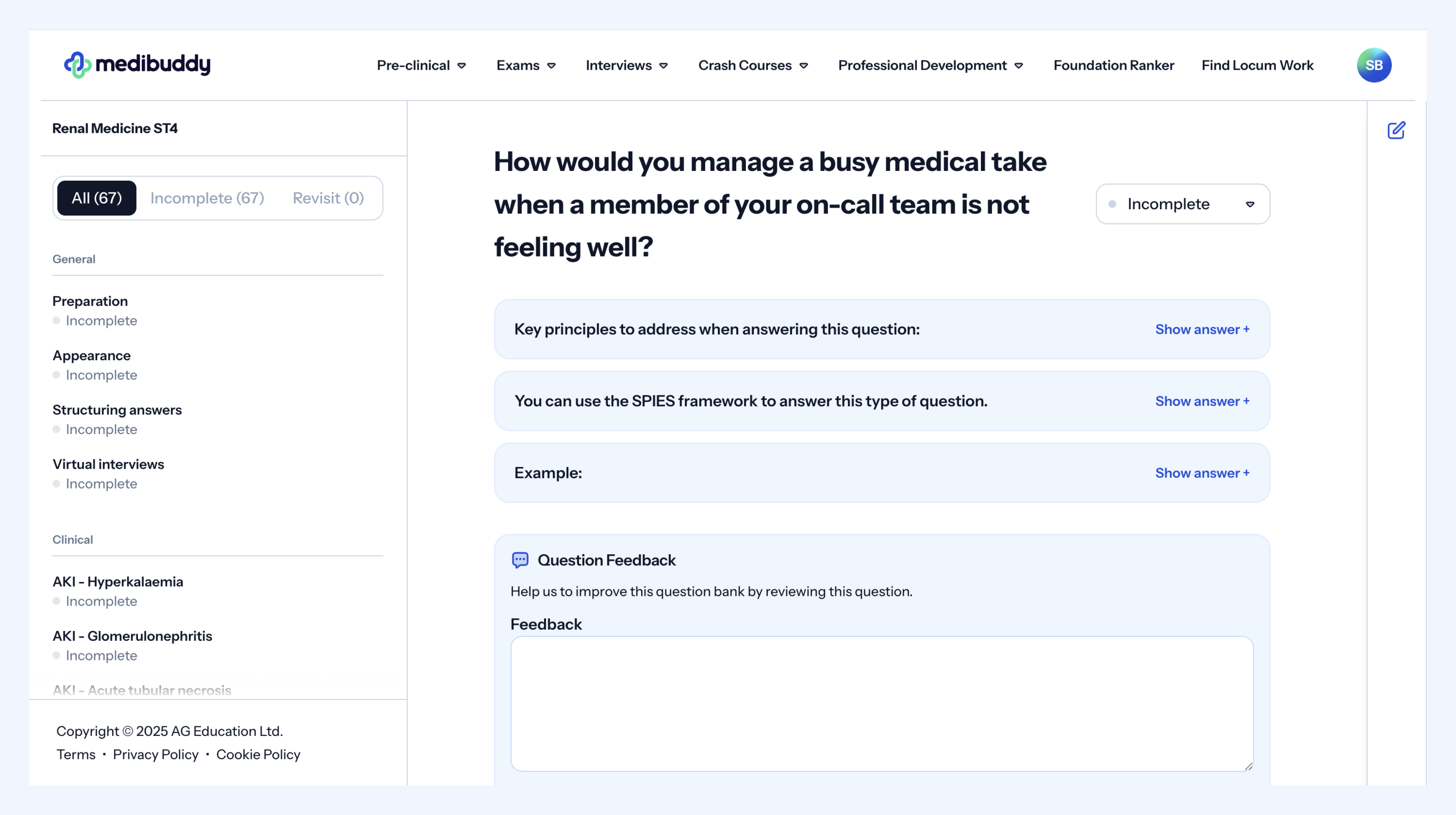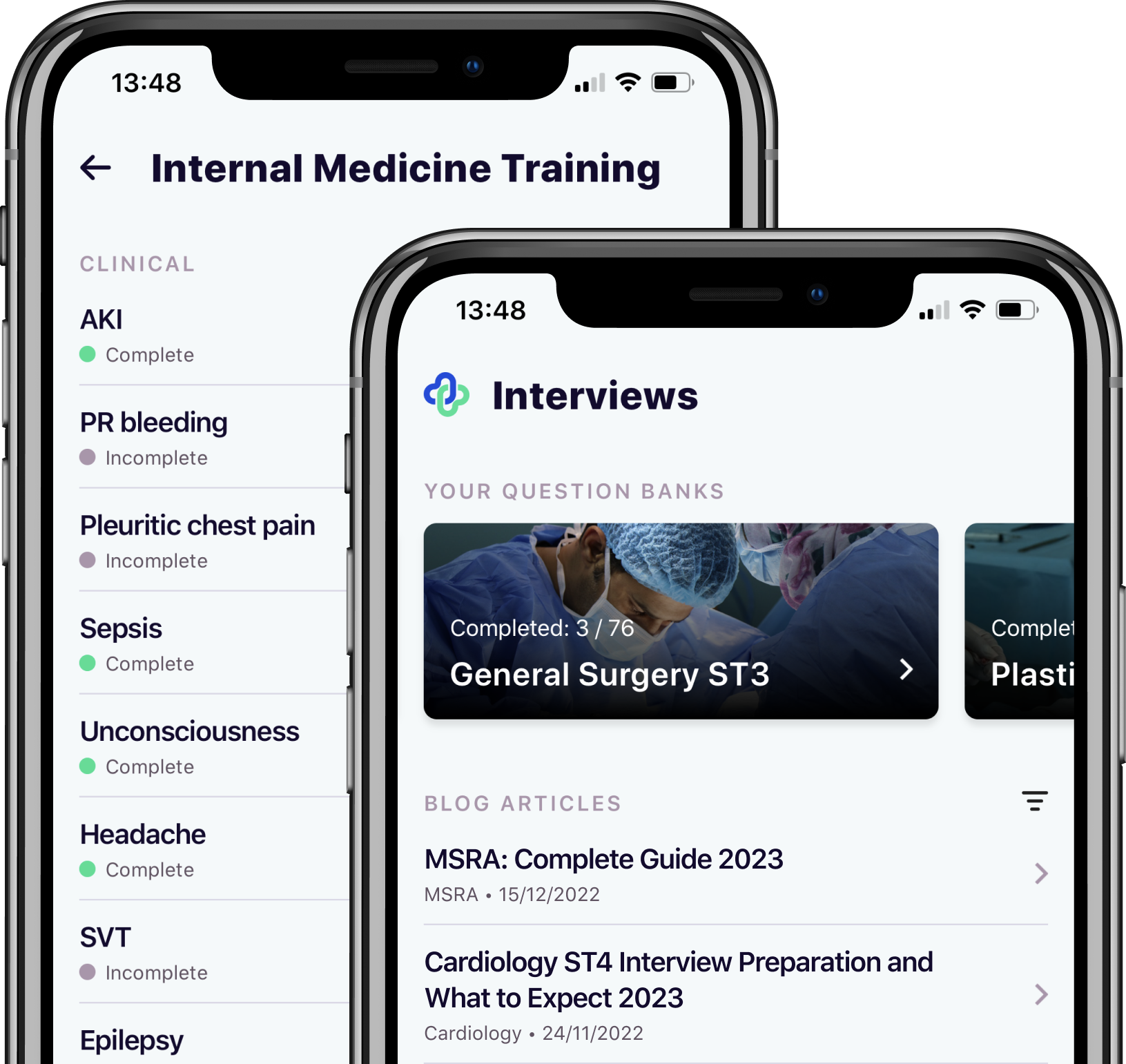
Renal Medicine ST4 Interview: Complete Guide 2026
If you’re currently completing IMT3 and looking to apply for Renal Medicine ST4 (nephrology), we’ve created this guide to help you plan for your application and interview. We will provide everything you need to know about the interview timeline, format, and scoring to give you the best chance of success.
For round 1 in 2025 there were 206 applications for 58 posts, giving a competition ratio of 3:55. This means there were more than three applicants for every renal medicine post. Bear in mind, however, that many applicants apply to more than one specialty. You can find out application numbers and competition ratios here (on the “data” tab).
Renal Medicine ST4 Interview Timeline
The key dates for renal medicine ST4 2026 recruitment are as follows:
| Stage | Date |
|---|---|
| Advert appears | 19 November 2025 by 5pm |
| Applications open | 20 November 2025 at 10am |
| Applications close | 11 December 2025 at 4pm |
| Evidence upload window | 14 – 26 January 2026 |
| Interview window | 24 – 26 March 2026 |
| Offers released | 14 April 2026 by 5pm |
| Hold deadline | 22 April 2026 at 1pm |
| Upgrade deadline | 23 April 2026 at 1pm |
| Interview feedback release date | 24 April 2026 |
| Posts commencing from date | 5 August 2026 |
Renal Medicine ST4 Applications
Renal Medicine is a Group 1 specialty and you will dual specialise with general internal medicine. Candidates are therefore required to have completed the internal medicine training (IMT) stage 1 programme or equivalent. The only exception is for current intensive care medicine trainees who are applying with the intention to dual train in this specialty.
For more information, please see the “Planning your application” tab here and take a look at the Renal Medicine ST4 eligibility criteria.
As part of the shortlisting process, you will be assessed on your achievements to date. You can score points based on your commitment to specialty, postgraduate degrees, additional achievements (e.g. undergraduate prizes), MRCP Part 2 qualifications (note, no score is given for MRCP Part 1 as this is an essential eligibility requirement), oral presentations, publications, teaching achievements, quality improvement projects, and leadership and management.
Therefore, gaining a full MRCP membership puts you on the right track to ensuring eligibility for Renal Medicine ST4 and boosting application points.
Take a look well in advance at the scoring framework in order to identify any areas where you can maximise your points.
You can find more information about the application form on the Physician Higher Specialty Training Recruitment website.
Boost your Renal Medicine ST4 Application Score through Teaching
Gaining formal training in teaching can strengthen your Renal Medicine ST4 application. While postgraduate qualifications such as a PG Cert or PG Diploma can earn up to 3 points, they often take several months to complete and may not be practical before interview season.
If you’re looking for a quicker option, attending a Live Teach the Teacher Course that includes at least six hours of live, synchronous teaching will award you 1 point on your application. Our course is available in both 1-day and 2-day formats, allowing you to choose the approach that best fits your timetable.
What is the Renal Medicine ST4 Interview Format?
The Renal Medicine ST4 Interview can be daunting, but it needn’t be. Preparation is key. Take the time to familiarise yourself with the format of the interview, as well as the scoring framework. Some stations are more heavily weighted than others, so it may be worth focusing your attention on these. Practise your answers in front of the mirror and with colleagues. Perhaps even arrange an informal mock interview with a consultant so you have had a go under pressure.
Maximise your performance at the Renal ST4 interview by preparing effectively and efficiently with our Interview Question Bank.
Currently, the interview is split across two stations, each with two questions to answer. In station 1 you will also be assessed on your communication skills. This gives a total of 5 domains in which you are scored (clinical, ethical, communication, medical registrar suitability, and suitability and commitment to specialty).
Each station will last 15 minutes. So, including the time between stations, you can expect the interview to take approximately 40 minutes.
Station 1, Question 1 – Clinical Scenario
In this station of the Renal Medicine ST4 interview, the question will be based on a clinical case. You will be presented with a brief vignette and you will have several minutes to collect your thoughts before the questioning begins. During this time, you should consider the following:
- The steps you might take
- Any possible treatment options
- Any further information you might try to gather
- How you’re going to communicate with those involved in the scenario, for example, patients, family members, colleagues, etc.
- Any other factors you consider appropriate, using your experience and professional judgement
The scenario will usually develop, and a series of subsequent questions will follow.
An example clinical scenario and follow-up questions from our Renal ST4 interview question bank can be seen below:

Remember, many applicants will have limited renal experience. You are not expected to answer the questions as a nephrologist, but rather you should demonstrate that you are a safe, logical and confident doctor. Escalate early and always discuss with your consultant if there are any concerns.
Common scenarios that typically come up in this station include (but are not limited to):
- Acute kidney injury
- The overloaded heart failure patient
- Line infection
- Thrombosed fistula
- PD peritonitis
In addition, make sure you know the indications for haemodialysis, what is in an acute renal screen, and safe parameters for transferring a renal patient to a tertiary centre.
This question will last approximately 8 minutes.
Station 1, Question 2 – Ethical Scenario
Again, you will be given a brief vignette based on a clinical case. However, unlike the clinical scenario, the ethical scenario will not be given to you in advance so there is no preparation time. The focus will be on the moral, ethical and legal implications of the situation. You may be asked one or two follow-up questions related to the same case.
You will be assessed on your responses to the ethical scenario and your knowledge of the different ethical and legal considerations required.
Familiarise yourself with GMC Good Medical Practice, the four pillars of medical ethics, and key ethical principles, such as duty of care, clinical negligence, duty of candour, confidentiality, consent, capacity (and the Mental Capacity Act), advanced care planning, withdrawing treatment, ceilings of care and end of life decisions.
Often this station will be based on a renal case, for example:
- A patient with dementia who does not wish to continue haemodialysis. You may have to deal with capacity assessment and family discussions.
- A frail patient on haemodialysis who would like to have a second renal transplant. Discussion may surround capacity, fitness for transplantation, or alternatives to haemodialysis.
Also, be prepared for questions related to improving practice, advantages and disadvantages of clinical research and the main principles of clinical governance.
This question will last approximately 7 minutes.
Station 1 – Communication Mark
The communication mark is not a separate question. However, you will receive a separate mark specifically for the communication skills which you demonstrate across the station, during the clinical and ethical scenarios. This will include not only an assessment of how you communicate during the scenario, for example with patients and colleagues, but also how well you communicate with the interviewers throughout the two scenarios.
Here are some tips on how to maximise your communication mark in the Renal Medicine ST4 interview:
- Structure your answer. After you have read the vignette, summarise your main concerns and what you will need to address. This will make it easier for the interviewer to follow your thought process and also demonstrate that you are a logical thinker.
- Remember, this is an interview for a registrar post. Do not waste time enumerating your ABCDE approach as you might for an IMT interview. Instead, treat the station as though you are having a clinical discussion with your examiner. Explain your thought processes, weigh up the pros and cons out loud, and demonstrate your thinking.
- Empathise with the patient/relative/colleague in question. Check the patient’s understanding, detailing how you would explain something. Demonstrate that you care.
- Speak slowly and clearly. Take your time and don’t rush.
- Practise how you might explain common conditions or procedures to a patient (e.g. haemodialysis, peritoneal dialysis, tunnelled line insertion etc.)
- And finally, body language is very important. Smile and try to enjoy yourself!
Station 2, Question 1 – Medical Registrar Suitability
This question will focus on the non-clinical aspects of being a medical registrar and will revolve around two of the Capabilities in Practice (CiPs) from the Internal Medicine Stage 1 Curriculum:
- Managing an acute unselected take
- Managing a multi-disciplinary team, including effective discharge planning
At the start of this station, you’ll give a one-minute presentation summarising your experience managing the acute unselected medical take as a medical registrar. Focus on your key roles and responsibilities, how long you’ve worked in each role, the level of supervision you’ve had, the size and structure of your team, the number of patients you were responsible for, and any relevant non-clinical duties.
After your presentation, you’ll be asked two or three additional questions, for example, about managing multiple unwell patients or leading a team. The remainder of the station, lasting around 10 minutes, involves giving examples from your experience of managing a team caring for acute medical admissions.
Below is an example Medical Registrar Suitability question from our Renal ST4 interview question bank:

Often the line of questioning will ask you to give personal examples. Again, preparation is key. Make sure you have some examples in your armoury.
This question will last approximately 10 minutes.
Station 2, Question 2 – Suitability & Commitment
This question examines your suitability and commitment to training in this specialty. It also gives you an opportunity to expand on the information you provided in your application form.
Typically, you might be asked an open-ended question such as “Tell us about your commitment to ST4 training in nephrology, using examples from your portfolio”. Know your portfolio and prepare a structured answer in advance. Practise your response so that you are able to succinctly sum up your main achievements in about 2 minutes.
Be able to talk about your strengths and relative weaknesses. You might also be asked where you see yourself in 5-10 years’ time, where you see the specialty evolving, and what challenges you anticipate.
Most importantly, be enthusiastic. Consultants are looking for a trainee who is interested in their specialty and who they will enjoy working with and teaching.
This question will last approximately 5 minutes.
Renal Medicine ST4 Interview Scoring
For each station, a different pair of interviewers will assess you separately against the two questions/scenarios. They will mark you based on a framework, reflecting how you are expected to perform, giving you a score of 1-5 for each station.
| Mark | Rating | Assessment |
|---|---|---|
| 1 | Poor | Not considered appointable |
| 2 | Area for concern | Performed below the level expected from a core level trainee applying to the specialty
Possibly unappointable, subject to discussion and performance in other areas |
| 3 | Satisfactory | Performed at the level expected of a core level trainee applying to the specialty
The candidate is suitable for a higher specialty training post |
| 4 | Good | Above average ability
The candidate is suitable for a higher specialty training post |
| 5 | Excellent | Highly performing trainee
The candidate is suitable for a higher specialty training post |
The total of your ten scores will result in a raw interview score (RIS) between 10 and 50. In order to receive offers, your application needs to be considered as ‘appointable’. For this, you must meet all of the following three criteria:
- None of your ten interview scores can be 1/5
- No more than two of your ten interview scores can be 2/5
- Your RIS must be 30 or above
Failing to meet any of these requirements means your application will be considered as ‘not appointable’. And as a result, it will not progress any further in that round.
Here is an example of the Renal Medicine ST4 interview feedback that one high-scoring candidate received during the 2023 Round 1 cycle. Although this example is from a few years ago, the interview structure and scoring criteria have remained broadly similar, so it should still give you a useful idea of what panellists look for and how your responses may be assessed.


Total Score
After the interview, a weighting is applied to the scores in each area as well as to your application score, giving a total score. Your total score will determine your ranking and influence how subsequent offers are made.
As you can see, the interview accounts for the bulk of your total score (80/100) and your application form only carries a small number of your total score (20/100). Note also that some stations carry more weight (e.g. clinical scenario and suitability and commitment). It may be worth focusing your attention on these stations during your preparation
| Interviewer 1 | Interviewer 2 | Weighting | Max score | |
|---|---|---|---|---|
| Clinical scenario | /5 | /5 | 2.0 | 20 |
| Ethical scenario | /5 | /5 | 1.5 | 15 |
| Communication mark | /5 | /5 | 1.0 | 10 |
| Medical registrar suitability | /5 | /5 | 1.5 | 15 |
| Suitability and commitment | /5 | /5 | 2.0 | 20 |
| Raw interview score | /50 | |||
| Interview score (with weighting) | 80 | |||
| Application score | /50 | 0.4 | 20 | |
| Total score | 100 | |||
You can find more information about how the ST4 Renal Medicine interview is scored and the weighting that’s applied to each area here (on the “interview and scoring” tab).
We’ve designed our Renal ST4 interview question bank to help you succeed at interview! With a broad range of interview questions and high-quality answers and examples covering all elements of the interview. You can find out more about our new Renal ST4 interview question bank here.
Good luck!
Further Reading

Take your subscriptions with you
Our mobile app allows you to access your interview and exam question banks wherever you are.




